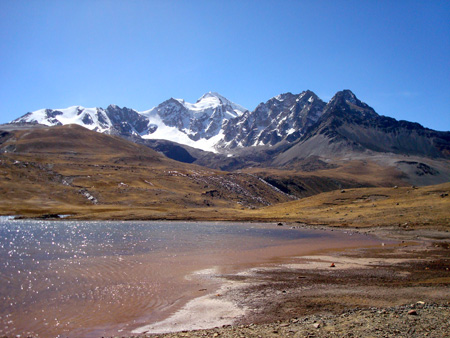On July 2008, Oddee's crew went to one of the most beautiful countries in the world: Bolivia. Located in the Altiplano (spanish for "high plain"), it's the most extensive area of high plateau on earth outside of Tibet. Its height averages about 3,300 meters (11,000 feet), and unlike the Tibetan Plateau, the Altiplano is dominated by massive active volcanoes of the Central Volcanic Zone to the west. Along with photographer Robert Dam, we took some of the most surreal views of this fascinating country.
Chacaltaya Mountain
It takes about an hour to climb up to the top, but the view is outstanding. The glacierial mountain of Chacaltaya is located near Lake Titicaca, with an elevation of 5421 m (17,785 feet). It's about 30 km from La Paz, near Huayna Potosí mountain, and it's one of the highest glaciers in South America. Although the glacier is over 18,000 years old, over 80% of it has melted since 1987 and it is expected to disappear by 2008.
Frozen Lake
Not far from the Red Lagoon we found this unidentified frozen lake; absolutely beautiful.
Illimani Mountain and the Milluni Valley
Illimani (from Aimara, meaning "golden eagle") is the highest mountain in the Cordillera Real (part of the Andes) of western Bolivia, next to La Paz. The best view you'll get is from the Milluni Valley, an hour from downtownLa Paz. The valley itself is absolutely beautiful, full of llamas, rocks and fascinating lakes.
Moon Valley
Located on the outskirts of La Paz, the Moon Valley (Valle de La Luna) is an incredible rock formation caused by erosion, giving the sensation to be in a real lunar landscape. They say it was once visited by Neil Armstrong himself.
Red Lagoon
Not far from the Uyuni Flats, the beautiful Red Lagoon (Laguna Colorada) is a shallow salt lake in the southwest of the altiplano of Bolivia, close to the border with Chile. The lake contains borax islands, whose white color contrasts nicely with the reddish color of its waters, caused by red sediments and pigmentation of some algae.
Siloli Desert
Part of the National Reserve Eduardo Abaroa, the Siloli Desert is famous for its tree-like rock formations, specially the one known as the "Stone Tree", which was formed during the uprising of the Andes.
Uyuni Flats
The Salar de Uyuni (spanish for Uyuni Flats) is the world's largest salt flat at 10,582 km2 (4,085 square miles). It took a 7 hour train from Oruro (3 hours from La Paz) to reach the city of Uyuni, and another 2-hour drive to the flats. Located in the Potosí and Oruro departments in southwest Bolivia, near the crest of the Andes, it is 3,650 meters high. Some 40,000 years ago, the area was part of Lake Minchin, a giant prehistoric lake. When the lake dried, it left behind two modern lakes, Poopó Lake and Uru Uru Lake, and two major salt deserts, Salar de Coipasa and the larger Uyuni. Uyuni is roughly 25 times the size of the Bonneville Salt Flats in the United States. The Salar is estimated to contain 10 billion tons of salt, of which less than 25,000 tons is extracted annually.


















No comments:
Post a Comment